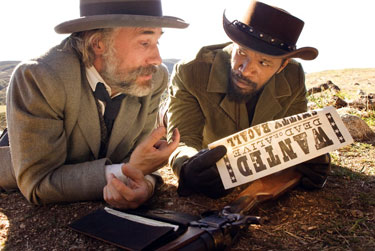Here comes Quentin Tarantino, galloping into the terrible history of American slavery with a shotgun in his hands and a bundle of dynamite slung across his chest. He won't indulge a lick of sensitivity, accuracy, or brevity along the way -- unlike just about every other filmmaker who's tackled the subject -- but he's more than willing to splatter gallons of blood in lieu of decency. Slavery was an indecent atrocity, so in a deeply uncomfortable way, doesn't it deserve at least one indecent storyteller?
That's the rub of Django Unchained, Tarantino's latest and angriest film. In equal measure both nauseating and beautiful, it's a film entirely deserving of the controversial aura that surrounds it -- and it's easy to suspect that's the intended effect. Like Inglourious Basterds, Django Unchained takes significant liberties with the historic record to create a lusty revenge fantasy rife with punishment for evil men and women. Unlike Basterds, though, Tarantino dares this time to show what the sinners did to invite such violent retribution. And those crimes, as gruesome as they may be to us, are far closer to the truth than America is willing to admit.

Django Unchained: Waltz and Foxx
Django Unchained is, among many things, a straightforward description of the film. It's the story of Django (Jamie Foxx), a slave bought and freed by the German bounty hunter Dr. King Schultz (Christoph Waltz), who enlists his help to hunt down a trio of wanted criminals. After Schultz takes Django under his wing, training him in the art and morality of killing, he agrees to help save his wife Broomhilda (Kerry Washington) from a despicably genteel plantation owner named Calvin Candie (Leonardo DiCaprio). As the two men plunge further and further into the Deep South, they forge a tight bond over their mutual disgust for the racism the fuels slavery.
With that plot architecture, Tarantino stuffs mouthfuls of his trademark banter and social critiques, albeit in a surprisingly tempered manner. His criticism, delivered by way of Django and King, is more pointed than usual, signaling a kind of maturity that his previous films simply avoided. There's an acidic bite to Django Unchained, a concentrated outrage that erupts whenever evil blood is splashed on screen. (Which is often.) Tarantino isn't simply trying to show us that slavery was bad. He's created, in vivid detail, a revisionist history of the American South that focuses on the violent nature of intolerance. It's got no interest in historical accuracy. Only honest outrage.
So, just what exactly is Tarantino trying to say? Django Unchained seems to draw inspiration for its cartoonish revenge story from a blend of blaxploitation films and spaghetti westerns, repurposing the social indignation of the former to emphasize the stylized violence of the latter. Before Django and King kill, we're shown the deep roots of bigotry that arguably justify the punishment. Those roots even transcend the color of a person's skin; the film's most fascinating character, Stephen (Samuel L. Jackson), is a slave who subscribes to racial oppression more than any other. By Tarantino's judgment, it seems, both the perpetrators of bigotry and those who benefit from it deserve to be killed.
That kind of message makes for an awfully dour movie, of course. In Tarantino's hands, however, Django Unchained is more an exploitation comedy than an anti-bigotry drama. A nighttime lynching scene that features Don Johnson in a Klu Klux Klan outfit is uproarious, while Waltz's clipped delivery and comic timing lends an air of absurdity to the outrageous violence that trails Dr. Schultz like a foul odor. On the "Candieland" plantation, DiCaprio chews scenery with an unnerving ferocity and Jackson oozes contempt as his favored house slave; in a film filled with bold performances, those two stand out as the most audacious.
DJANGO UNCHAINED


 Starring Jamie Foxx, Christoph Waltz, Leonardo DiCaprio Rated R 165 minutes Now playing Area theaters
Starring Jamie Foxx, Christoph Waltz, Leonardo DiCaprio Rated R 165 minutes Now playing Area theaters
Most of the credit for Django Unchained, nonetheless, deserves to go to the madmen behind the scenes. Cinematographer Robert Richardson captures action sequences with an impressive clarity that doesn't sacrifice Tarantino's brutal, violent style. (Django's final shootout is a masterpiece on both accounts.) Even when the bullets aren't flying, though, Richardson frames gorgeous shots that contrast the diversity of the South against the ever-present bigotry Django faces wherever he goes. And, naturally, Tarantino tops it all off with a brilliant soundtrack that pulls from musicians as dissimilar as Jim Croce and Rick Ross. Contrary to what his critics might believe, Tarantino isn't simply repurposing genre or style. He's stripping down these pieces and reconstructing them into an entirely new piece of art.
This is not Tarantino's best film. Far from it. And yet, it seems like a tremendous shift in his filmmaking. He's matured from stylized gangster flicks to pragmatic revenge fantasies to, finally, a full-throated attack on social injustice and evil. Hollywood's wild-eyed son has finally grown up.
...more